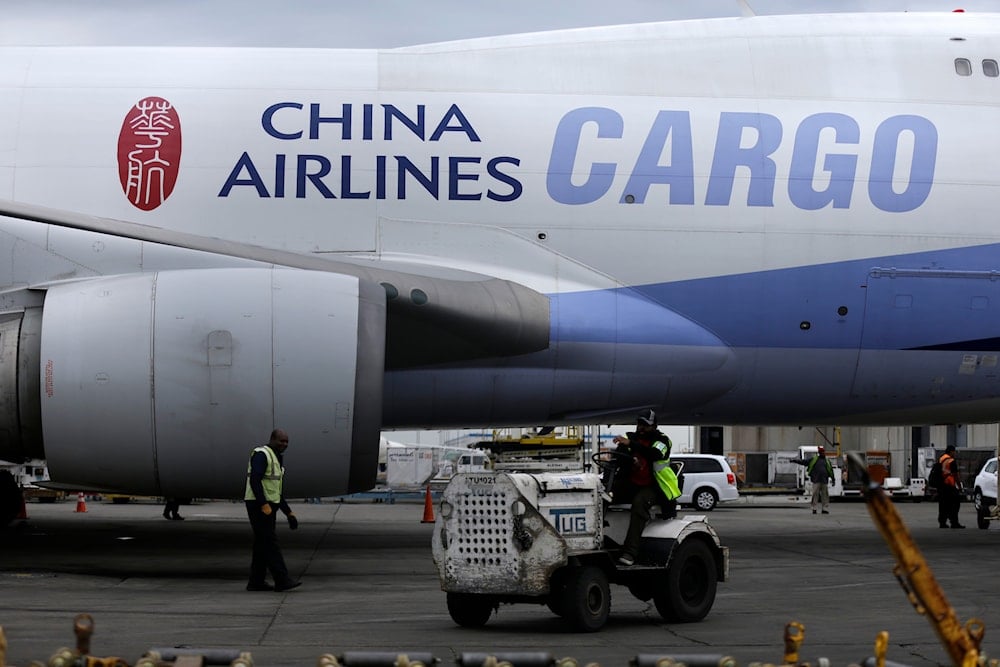China-EU trade: New ‘air silk road’ links Xinjiang to Europe
China’s ‘Air Silk Road’ has opened over 40 freight routes linking Xinjiang to Europe in the past year, carrying thousands of tons of goods despite protests by Western-backed rights groups.
-

China Airlines Cargo plane, Boeing 747-400, is unloaded as it arrives at O'Hare International Airport in Chicago on April 22, 2019. (AP Photo/Kiichiro Sato)
China’s new ‘Air Silk Road’ is rapidly expanding trade between Xinjiang and Europe, despite growing concerns from Western-based rights groups over Uyghur treatment in the region.
In the past year, more than 40 cargo routes have opened between airports in Xinjiang and destinations across Europe, according to new analysis by the Washington-based Uyghur Human Rights Project (UHRP), cited by POLITICO on Tuesday.
The flights carry thousands of tons of goods, from e-commerce products and textiles to electronics, auto parts, and agricultural commodities, all sectors flagged as high-risk for forced labor.
The report details that UHRP tracked cargo flights from June 2024 to May 2025, revealing that over nine airlines now operate from Xinjiang to the UK, Germany, Hungary, Greece, Switzerland, Belgium, Ireland, and Spain. In May alone, 2,000 tons of goods from Ürümqi entered the EU, Switzerland, and the UK. That said, the UK received the largest share, with 313 flights in the past year, followed by Hungary with 162.
UHRP warns that the growth of these routes "poses a growing threat to the integrity of EU and UK supply chains." The group points to the difficulty of conducting independent audits in Xinjiang, where alleged forced labor is described as "widespread and systematic" by human rights watchdogs, UN experts, and survivor testimonies.
Despite the claims of difficulty, Chinese heads of state have reached out to UN watchdogs to visit Xinjiang Province.
Moreover, British MP David Alton said the increase in flights “appears to fly in the face” of the EU’s newly adopted forced labor screening mechanism and urged targeted import bans to close gaps in the UK’s Modern Slavery Act.
Volkswagen has already left the region, citing its inability to verify labor conditions.
Cargo carriers respond to labor abuse allegations
Several airlines operating in Xinjiang say they have no visibility into the origins of the goods they transport.
CAMEX Airlines said cargo is often trucked in from other Chinese cities and claimed it opposes "forced labor". On the other hand, Geo-Sky stated its role is limited to airport-to-airport transport and that it has “no knowledge of or involvement in the alleged issues.”
European Cargo said it follows UK laws and recently updated its practices following a court challenge tied to Uyghur-produced cotton imports. Other carriers, including MNG Airlines, My Freighter, ROMCargo, S.F. Airlines, Titan Airways, and Uzbekistan Airways, did not respond to requests for comment.
Xinjiang’s Air Silk Road set for further expansion
According to POLITICO, Beijing has positioned Ürümqi airport as a central hub in its Belt and Road Initiative. That said, seven new airports are expected to open in Xinjiang by the end of 2025, adding to the 26 already operating in the region.
China-EU trade continues to trend upwards with the Euro bloc being Beijing's second-largest trading partner in the first four months of 2025, with trade value topping 1.78 trillion yuan ($246.4 billion) according to data released by the General Administration of Customs (GAC).
The GAC stated that the value recorded a year-on-year increase of 1.1% and accounted for 12.6% of total foreign trade with China, following the Association of Southeast Asian Nations (ASEAN), which made up 16.8%.
"The latest data from Chinese Customs highlights a high complementarity between China and the EU, especially amid today's challenging global trade landscape," Zhao Junjie, a senior research fellow at the Institute of European Studies at the Chinese Academy of Social Sciences, previously told The Global Times.
Despite setbacks due to international restrictions, the EU and China have recognized the importance of increasing meaningful dialogue and cooperation, as stated earlier this year by Chinese Foreign Ministry spokesperson Lin Jian.

 4 Min Read
4 Min Read










